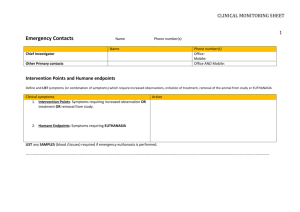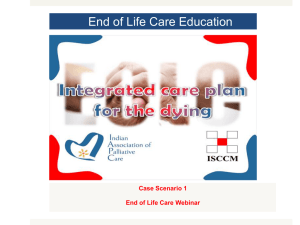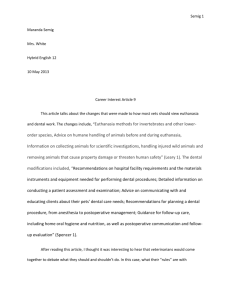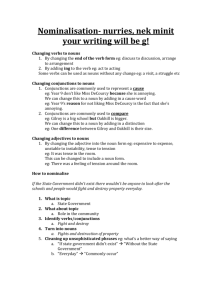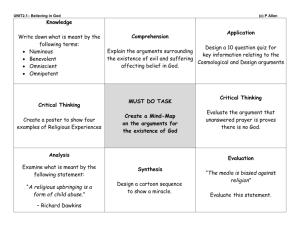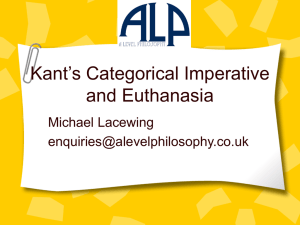The Bible says nothing explicit about Euthanasia
advertisement
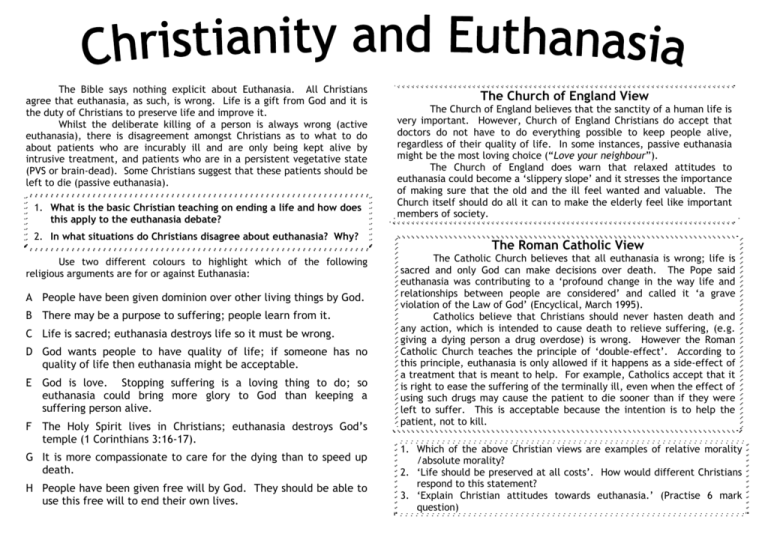
The Bible says nothing explicit about Euthanasia. All Christians agree that euthanasia, as such, is wrong. Life is a gift from God and it is the duty of Christians to preserve life and improve it. Whilst the deliberate killing of a person is always wrong (active euthanasia), there is disagreement amongst Christians as to what to do about patients who are incurably ill and are only being kept alive by intrusive treatment, and patients who are in a persistent vegetative state (PVS or brain-dead). Some Christians suggest that these patients should be left to die (passive euthanasia). 1. What is the basic Christian teaching on ending a life and how does this apply to the euthanasia debate? 2. In what situations do Christians disagree about euthanasia? Why? Use two different colours to highlight which of the following religious arguments are for or against Euthanasia: A People have been given dominion over other living things by God. B There may be a purpose to suffering; people learn from it. C Life is sacred; euthanasia destroys life so it must be wrong. D God wants people to have quality of life; if someone has no quality of life then euthanasia might be acceptable. E God is love. Stopping suffering is a loving thing to do; so euthanasia could bring more glory to God than keeping a suffering person alive. F The Holy Spirit lives in Christians; euthanasia destroys God’s temple (1 Corinthians 3:16-17). G It is more compassionate to care for the dying than to speed up death. H People have been given free will by God. They should be able to use this free will to end their own lives. The Church of England View The Church of England believes that the sanctity of a human life is very important. However, Church of England Christians do accept that doctors do not have to do everything possible to keep people alive, regardless of their quality of life. In some instances, passive euthanasia might be the most loving choice (“Love your neighbour”). The Church of England does warn that relaxed attitudes to euthanasia could become a ‘slippery slope’ and it stresses the importance of making sure that the old and the ill feel wanted and valuable. The Church itself should do all it can to make the elderly feel like important members of society. The Roman Catholic View The Catholic Church believes that all euthanasia is wrong; life is sacred and only God can make decisions over death. The Pope said euthanasia was contributing to a ‘profound change in the way life and relationships between people are considered’ and called it ‘a grave violation of the Law of God’ (Encyclical, March 1995). Catholics believe that Christians should never hasten death and any action, which is intended to cause death to relieve suffering, (e.g. giving a dying person a drug overdose) is wrong. However the Roman Catholic Church teaches the principle of ‘double-effect’. According to this principle, euthanasia is only allowed if it happens as a side-effect of a treatment that is meant to help. For example, Catholics accept that it is right to ease the suffering of the terminally ill, even when the effect of using such drugs may cause the patient to die sooner than if they were left to suffer. This is acceptable because the intention is to help the patient, not to kill. 1. Which of the above Christian views are examples of relative morality /absolute morality? 2. ‘Life should be preserved at all costs’. How would different Christians respond to this statement? 3. ‘Explain Christian attitudes towards euthanasia.’ (Practise 6 mark question)

